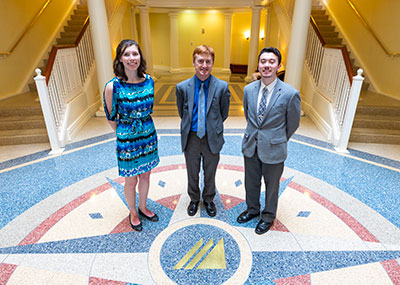Read time:

The National Science Foundation (NSF) has awarded Dr. Peter Monaghan, assistant professor of physics, a grant totalling $242,000 over three years in support of his research program at nearby Thomas Jefferson National Accelerator Facility (JLab). Monaghan studies the interaction of protons and neutrons and their internal structures.
"At JLab, the experiments will scatter electrons off target nuclei, such as hydrogen, helium and carbon, among others," says Monaghan. "By measuring the energy, momentum and trajectory of the scattered particles, the interaction can be reconstructed from the experimental data, and we can learn about the underlying physics." He is involved in two particular projects: a theory-based effort to help improve models of nucleon structure, and an experimental effort to build a new spectrometer system called the Super Bigbite Spectrometer (SBS).
The grant will support two CNU undergraduates and one graduate student, full time, from the Department of Physics, Computer Science and Engineering (PCSE). Two newly graduated seniors, Ralph Marinaro and Katie Whitcomb, worked with Monaghan on the SBS project and will attend graduate school to pursue their PhDs in physics. Marinaro is going to the University of Glasgow, while Whitcomb will attend Emory University. Their research efforts will be continued by PCSE rising juniors Taylor Edwards and Kara Ferner. The award also supports PCSE graduate student Andrew Moyer, who worked on an experiment searching for dark matter.
Monaghan is an experimental nuclear physicist specializing in nucleon structure and hardware development. He teaches classical mechanics and nuclear and particle physics. He holds a PhD from Massachusetts Institute of Technology.